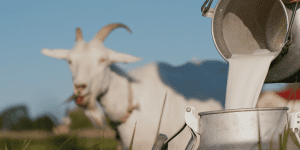Can Dogs Drink Goat’s Milk?
Goat’s milk is becoming a more popular milk drink for people and yes – pets too! The positive thing about goat’s milk compared to cow’s milk is, it is more easily digested and less likely to cause allergic reactions. However, not all dogs should drink goat’s milk and there are some reasons why it might not be right for your dog. Read our Holidays4Dogs article to find out more about adding goat’s milk to your dog’s diet.
Goat’s milk is full of vitamins and minerals as well as enzymes, protein, electrolytes and fatty acids. However, like humans, many dogs cannot digest dairy products. Before you decide to add goats milk to your dog’s diet, let’s look first at some of the reasons why it may not be suitable for your dog, (or you).
Lactose.
Milk contains lactose – which is the milk sugar. In order for the body to break this down it needs a good supply of the digestive enzyme – lactase. Without this lactose can cause intolerance which may include;
Bloating.
Wind.
Vomiting.
Loss of appetite.
Aggravation of skin and digestive issues.
If your dog already has skin or digestive issues, it would be better to avoid dairy products altogether.
Fat content.
Goat’s milk is higher in fat content than cow’s milk – and those fats are saturated fats too. While saturated fats don’t affect dogs in the same way they do in humans, it is still better to make sure your dog is not consuming too much. Excess consumption of milk can lead to high cholesterol. In turn, this can impact on the dog’s overall health.
Health benefits of Goat’s milk.
Because goat’s milk is full of digestible probiotics, it can help with all manner of diseases. These include conditions such as, liver and kidney disease, diabetes, poor digestion and gastrointestinal disease.
Fermented goat’s milk is even more nutritional since the process of fermentation adds more probiotics. Research has found it to be beneficial in soothing irritable bowel, ulcers, arthritis and even more serious health conditions such as brain disorders and heart disease..
The importance of quality.
It is important to check the quality of goat milk if you intend to purchase some for your dog, (or yourself).  Pasteurisation will lower the quality of the milk, as will goats that have been injected with antibiotics, or fed GMO foods.
Pasteurisation will lower the quality of the milk, as will goats that have been injected with antibiotics, or fed GMO foods.
Fermented goat’s milk needs to be from raw milk, as the good bacteria thrives when it has not been damaged by the heating process.
Introducing raw fermented milk to your dog’s diet can provide powerful antioxidants, as well as probiotics and concentrated vitamins.
It is possible to find fermented goat’s milk in health food stores, supermarkets, or on line.
Conclusion.
Goat’s milk definitely has a lot of health benefits for people and dogs. However, there is probably no need to feed it to an adult dog every day. As a complementary addition to a dog’s diet, goat’s milk has some very clear health benefits.
Our guest dogs do need to bring their own food with them for all dog stays. However, we can cater for many different types of dog’s diet and will always follow this carefully. If your dog has a special diet, such as the BARF diet, please provide details to your carer when you meet them before a dog stay.



